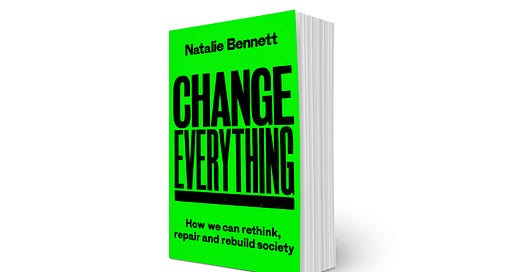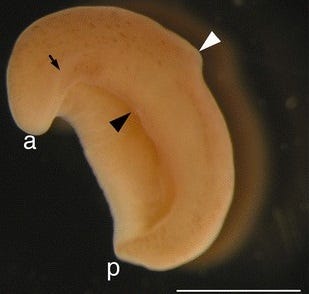Welcome to my Substack, Change Everything
New thinking in politics, science, history and books from Natalie Bennett
Substack is "the next new thing" in democratic communication, says the Guardian. Certainly, I’m finding the email newsletter format, which sits in your inbox waiting for a convenient moment, a good way to find the useful and interesting in our immensely rich world of content. And I’m delighted to see it being deployed in the revival of quality local journalism by The Tribune (Sheffield), The Mill (Manchester), The Post (Liverpool) and The Dispatch (Birmingham). Linking to an amazing collection of already 15,000 podcasts, I am naturally a New Books Network subscriber, and with my interest in the human microbiome, Gut Feelings with Prof Tim Spector is an obvious click. And Politico’s London Playbook is how I, and much of Westminster, start the day.
So what’s going to be in my Substack?
I say, tongue in cheek, that I operate with an Agile management system, otherwise known as dealing with the daily deluge of parliamentary, political and, increasingly, publishing work by doing what’s most urgent, important or - sometimes - fun. I don’t use energy worrying about what I haven’t done. I don’t write lists or have neatly ranked priorities. Just producing those would take time when I could be doing things. And politics now is so much about “events my dear boy, events, any list would be overtaken before the ink dried.
So this newsletter will no doubt be an evolving organism, if hopefully one with a bit more shape than a Xenoturbella (click on pic above for explanation). But I think there’s going to be one piece of original “thought”, maybe about politics or the work I am doing on my second book (of which more anon) each edition. There’s going to be a “best of the week” list of recommendations. (Because there’s so much amazing stuff out there that deserves to be highlighted.) The newsletter will come out once a week, more or less. (Promise I’m not going to spam you.)
And there’s bound to be news on my forthcoming first book Change Everything: How We Can Rethink, Repair and Rebuild Our Society, which I can reveal …. 🥁 …. will be out on March 21. You can pre-order now (from £5.99 for the ebook). Want more sense of what it is about? See here.
Thinking wellbeing
In noting the end of the What Works Wellbeing unit, James Kirkup In The Times (£) has done a service in highlighting the way the UK is heading in the opposite direction to many healthier, happier nations. As Kirkup identifies, while national debate is focusing on tax changes to increase the wealth of a few, what we really need are routes to healthier lives, places and communities.
That's why tackling our broken food system and the overwhelming flood of ultra-processed food-like substances pushed by supermarkets, moving to a four-day working week as standard with no loss of pay, and promoting active travel, walking and cycling in re-greened urban spaces are issues that should be at the centre of political debate and effort. As should be genuine devolution of power and resources to local communities, not the performative inaction of the Levelling Up Act.
Kirkup is right too to focus on the plight of younger people. Loaded with unpayable student debt (now being extended beyond universities), facing the uncertain future of climate emergency and nature crisis, rethinking our schools and restoring free education and training should be front and centre for them.
I’m not a full-on fan of the “What Works” approach - it has a strong strand of positivism, of an assumption that social change can be treated like a hard science - just crunch the numbers and follow the results, when local communities are each different in social, economic and physical geography, and have creative potential to conclude “what works” for themselves.
But there is no doubt that the UK has a huge problem with continuing and expanding beyond successful pilot schemes for social interventions to actual delivery. There’s a lot of funding for pilots, but more than a decade of austerity, and decades of centralisation of power and resources in Westminster, means there’s precious little funding for longterm delivery of so many essential services.
BECAUSE it is that time of the year, I have also been writing other political reflections - on how we need to give up Victorian thinking about schools, prisons and welfare, for Left Foot Forward, and acknowledge the disastrous impacts of treating the planet as a mine and a dumping ground on Bright Green. (And on Yorkshire Bylines I looked back over a year in the House of Lords.)
Picks of the week
Reading
Bennelong & Phillip: A History Unravelled by Kate Fullagar: the reverse chronology of this dual biography of the first governor of the colony of New South Wales and the Aboriginal leader who was forced to deal with him is enlightening. One man dies in disappointment and isolation, the other respected at the centre of his complex social networks. And the order is not what you think. So much Australian history has been recovered in recent years; if you don’t follow blow-by-blow this is a good way to catch up with a lot of the new understanding. And if you’ve no connection to Australia, well you’ll get a new perspective on the British empire and the genocide it enacted on the continent. (There’s a useful reflection on the book on the brilliant Conversation.com website.)
Listening
Debate and controversy around the instability of ideas of sex and gender is nothing new. On the French Studies channel of the New Books Network, in Unmaking Sex The Gender Outlaws of Nineteenth-Century France, Anne E Linton compares and contrasts the literary and medical perspectives with which intersex people had to deal at the time.
Thinking
In Nature, a comment piece from Jason Hickel - Degrowth can work: here’s how science can help - is its most-read over the holiday season. In part due to “a lot of tech bros and economists getting Very Upset”.
Researching
Wandering albatrosses over a full lifetime fly the equivalent of ten times to the Moon and back, up to 10,000km in a single foraging trip. Researchers have just found how they can use “infrasound” (low-frequency, below the level that we can hear) to help with navigation. How little we understand about the world we are fast trashing.
Almost the end
So that’s all for now, this first edition of the Change Everything substack. If someone forward this to you, or you are reading it on the web, then you might want to …
If you want to share thoughts about anything in the newsletter.
The end
Have a happy 2024. Remembering that the one thing that is certain about where we are now is that the world is profoundly unstable, politically, economically, educationally. And that is good news, because change is a certainty. And what that change looks like is up to all of us, because history is not prewritten, but made by our actions.
You can also find me on Instagram, Facebook, LinkedIn, TikTok and X.





